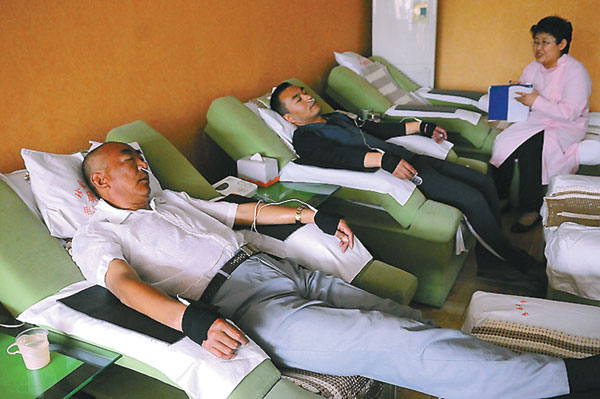Treatments help to quell the habit
By Liu Zhihua ( China Daily ) Updated: 2014-12-27 13:39:50
 |
|
Smokers take a smoking cessation treatment in a specialized clinic in Liaocheng, Shandong province. [Photo by Zhang Zhenxiang/For China Daily] |
It is about 2:30 in the afternoon, and Wang Xiaohong, the smoking-cessation therapist with Peking University Third Hospital, is talking with a husband and wife about ways for him to quit his habit.
She has been working in the hospital as a respiratory disease specialist since 1991, and started her practice as a stop-smoking adviser in 2007, when the hospital established one of the earliest smoking-cessation clinics in Beijing.
The man, a 59-year-old diabetic inpatient, came to Wang for help while he was hospitalized, because his wife asked him to, not because he wanted to.
Throughout the consultation, the wife asked Wang for information about how nicotine works, the side effects, and withdrawal symptoms, while the man put his hands in his pockets, repeatedly saying smoking wouldn't harm him, because he didn't inhale the smoke.
Wang's second patient, in fact, the mother of a so-called patient, was a woman in her 50s, who told Wang her daughter wants to quit smoking badly, but is too busy with work to come to the hospital.
The two patients were typical, Wang said.
"The World Health Organization recognizes cigarette smoking as a nicotine addition condition. But most Chinese people don't consider smoking as an addictive disease that needs medical intervention, " Wang said.
"I see dozens of patients in a half day at the respiratory disease clinic, but it is very rare that in half a day I will see even five patients who want to quit."
And few of those who do, come willingly, Wang said.
Hard to stop
Some come because their doctors advise them to, when they are diagnosed with life-threatening diseases for which smoking is a risk factor, such as heart disease, cancer or high blood pressure.
Some come because of pressure from their families.
There are also parents coming to buy quit smoking drugs to help their children, even though their children don't want to quit, Wang said.
The more addicted a patient is to nicotine, the harder it is for him or her to quit smoking. Only 3 percent of people will quit smoking by themselves, Wang said.
Treatment to stop smoking is not covered by health insurance. A course often lasts about three months, and costs about 2,000 yuan ($323) for nicotine replacement drugs.
During the treatment, withdrawal symptoms often occur, which include anxiety, irritability, insomnia, depression and weight gain.
The side effects of the drugs include wheezing, loss of taste, nausea, stomach pains and sleeplessness. They should only be taken under professional direction, Wang said.
A therapist also should encourage and support the patients and families to adopt behavioral changes to help overcome the cravings for tobacco, Wang added.
|
|
|
|
|
|
|
|

























 Raymond Zhou:
Raymond Zhou: Pauline D Loh:
Pauline D Loh: Hot Pot
Hot Pot Eco China
Eco China China Dream
China Dream China Face
China Face






